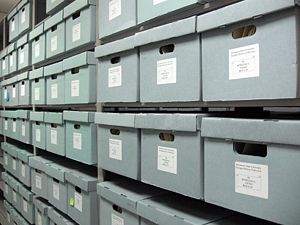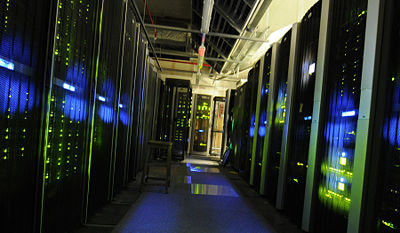Digital Archives
From DigitalRhetoricCollaborative
| Line 1: | Line 1: | ||
[[Image:3567689465 8e8d15b486 o.jpg | thumb | right | Stacks in the archives and records management department at Kennesaw State University. [https://flic.kr/p/6rgkMk Image by Anne G.] | 300px]] | [[Image:3567689465 8e8d15b486 o.jpg | thumb | right | Stacks in the archives and records management department at Kennesaw State University. [https://flic.kr/p/6rgkMk Image by Anne G.] | 300px]] | ||
| - | A '''digital archive''' is an accumulation of historical records and other primary source information. A litany of items can be digitally archived, including but not limited to photographs, manuscripts, memoirs and data. Practically any traditionally archived object can be replicated in some digital format. | + | A '''digital archive''' is an accumulation of historical records and other primary source information. A litany of items can be digitally archived, including but not limited to photographs, manuscripts, memoirs and numerical data. Practically any traditionally archived object can be replicated in some digital format. |
Digital archives are created and built upon every day. | Digital archives are created and built upon every day. | ||
Revision as of 21:15, 22 April 2015

A digital archive is an accumulation of historical records and other primary source information. A litany of items can be digitally archived, including but not limited to photographs, manuscripts, memoirs and numerical data. Practically any traditionally archived object can be replicated in some digital format.
Digital archives are created and built upon every day.
Contents |
Process
Curation is the process by which archived documents and items are selected, collected and arranged. Qualifications for the occupation of a digital archivist vary. Some institutions of learning place more emphasis on "programming skills such as PERL, XSLT, Ruby, HTML and experience working with SQL databases and repositories such as DSpace and Fedora," as well as a "variety of metadata standards" and "computer forensic tools such as FTK Imager, AccessData Forensic Toolkits and writeblockers." [1]
History
The Oxford Text Archive
The Oxford Text Archive is considered by many to be the world's oldest digital repository. [2] It was established in 1976 "to collect, catalogue, preserve, and distribute the electronic products of research and scholarship in all areas of textual, literary, and linguistic studies. The OTA holds an extensive collection of electronic texts and linguistic corpora in a variety of languages which are of interest to academics working in the humanities." [3]
Databases
A database is an organized, curated collection of data [4]. Databases are organized with a variety of models that allow for the most efficient retrieval of the data that they contain. A "database management system" (DBMS) allows users to interact with various databases in order to access a variety of stored content.
Educational Resources
Archives offer a wealth of primary resources for innovative education [5]. When working with archives for research in their coursework and projects, "participating students [are] more engaged with and excited about their coursework, sho[w] improvement in key academic skills, and achiev[e] better course outcomes than their peers." Professors and faculty members, in learning newly-established practices for teaching with primary resources, become "more thoughtful and effective instructors."
External Links
References
- ↑ http://blogs.loc.gov/digitalpreservation/2014/10/what-does-it-take-to-be-a-well-rounded-digital-archivist/
- ↑ "Oxford Archive of Electronic Literature". Association for Literary and Linguistic Computing Bulletin 5 (2): 205. 1977.
- ↑ http://www.tei-c.org/Activities/Projects/ox01.xml
- ↑ http://www.merriam-webster.com/dictionary/database
- ↑ http://www.teacharchives.org/articles/our-findings/
--K.E. Corbett

